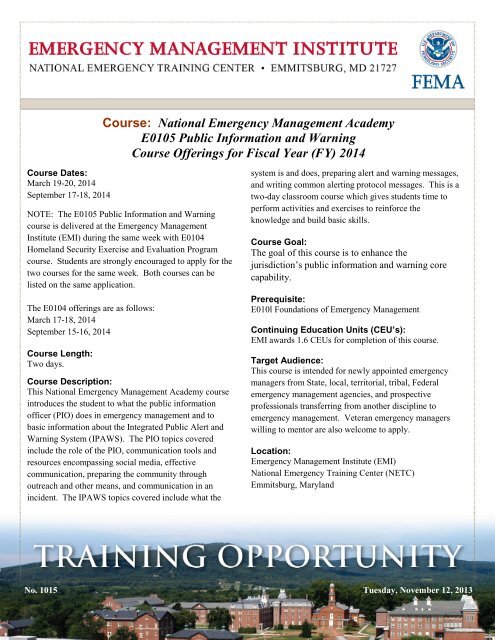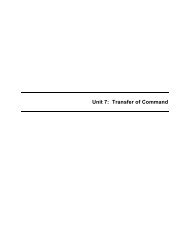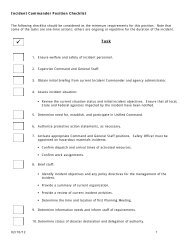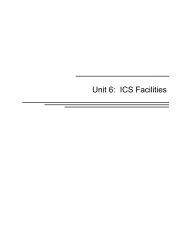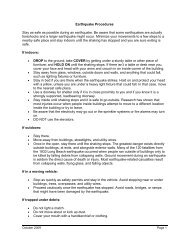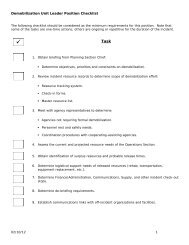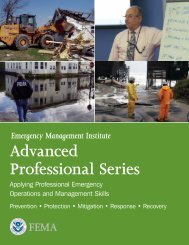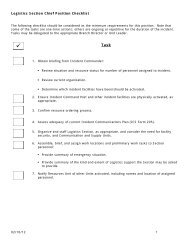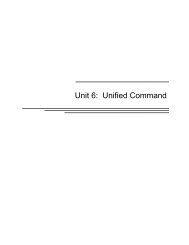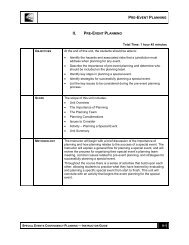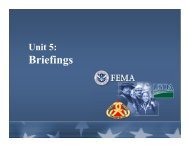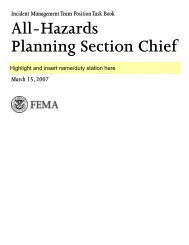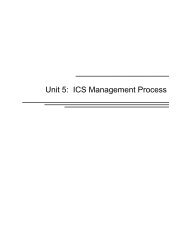E0105 Public Information and Warning - Emergency Management ...
E0105 Public Information and Warning - Emergency Management ...
E0105 Public Information and Warning - Emergency Management ...
Create successful ePaper yourself
Turn your PDF publications into a flip-book with our unique Google optimized e-Paper software.
Course: National <strong>Emergency</strong> <strong>Management</strong> Academy<br />
<strong>E0105</strong> <strong>Public</strong> <strong>Information</strong> <strong>and</strong> <strong>Warning</strong><br />
Course Offerings for Fiscal Year (FY) 2014<br />
Course Dates:<br />
March 19-20, 2014<br />
September 17-18, 2014<br />
NOTE: The <strong>E0105</strong> <strong>Public</strong> <strong>Information</strong> <strong>and</strong> <strong>Warning</strong><br />
course is delivered at the <strong>Emergency</strong> <strong>Management</strong><br />
Institute (EMI) during the same week with E0104<br />
Homel<strong>and</strong> Security Exercise <strong>and</strong> Evaluation Program<br />
course. Students are strongly encouraged to apply for the<br />
two courses for the same week. Both courses can be<br />
listed on the same application.<br />
The E0104 offerings are as follows:<br />
March 17-18, 2014<br />
September 15-16, 2014<br />
Course Length:<br />
Two days.<br />
Course Description:<br />
This National <strong>Emergency</strong> <strong>Management</strong> Academy course<br />
introduces the student to what the public information<br />
officer (PIO) does in emergency management <strong>and</strong> to<br />
basic information about the Integrated <strong>Public</strong> Alert <strong>and</strong><br />
<strong>Warning</strong> System (IPAWS). The PIO topics covered<br />
include the role of the PIO, communication tools <strong>and</strong><br />
resources encompassing social media, effective<br />
communication, preparing the community through<br />
outreach <strong>and</strong> other means, <strong>and</strong> communication in an<br />
incident. The IPAWS topics covered include what the<br />
system is <strong>and</strong> does, preparing alert <strong>and</strong> warning messages,<br />
<strong>and</strong> writing common alerting protocol messages. This is a<br />
two-day classroom course which gives students time to<br />
perform activities <strong>and</strong> exercises to reinforce the<br />
knowledge <strong>and</strong> build basic skills.<br />
Course Goal:<br />
The goal of this course is to enhance the<br />
jurisdiction’s public information <strong>and</strong> warning core<br />
capability.<br />
Prerequisite:<br />
E010l Foundations of <strong>Emergency</strong> <strong>Management</strong><br />
Continuing Education Units (CEU’s):<br />
EMI awards 1.6 CEUs for completion of this course.<br />
Target Audience:<br />
This course is intended for newly appointed emergency<br />
managers from State, local, territorial, tribal, Federal<br />
emergency management agencies, <strong>and</strong> prospective<br />
professionals transferring from another discipline to<br />
emergency management. Veteran emergency managers<br />
willing to mentor are also welcome to apply.<br />
Location:<br />
<strong>Emergency</strong> <strong>Management</strong> Institute (EMI)<br />
National <strong>Emergency</strong> Training Center (NETC)<br />
Emmitsburg, Maryl<strong>and</strong><br />
No. 1015 Tuesday, November 12, 2013
Page 2<br />
To Apply:<br />
Students attending any course(s) of the Academy are<br />
required to submit a FEMA Form 119-25-1, General<br />
Admissions Application to:<br />
NETC Admissions Office, Room I-216<br />
National <strong>Emergency</strong> Training Center<br />
16825 South Seton Avenue<br />
Emmitsburg, MD 21727-8998<br />
Phone: (301) 447-1035<br />
Fax: (301) 447-1658<br />
Email: netcadmission@fema.dhs.gov<br />
Scan the QR Code, or click the link to apply online:<br />
http://training.fema.gov/Apply/<br />
Application Review:<br />
In order to be evaluated for admission into this course,<br />
block #16 on the application form must be completed.<br />
Please refer to the student selection criteria listed below<br />
<strong>and</strong> indicate how you meet the requirements based upon<br />
your position <strong>and</strong> experience.<br />
Upon acceptance into the course, NETC Admissions will<br />
mail out an Acceptance Letter/Welcome Package<br />
outlining travel information, NETC shuttle services,<br />
lodging <strong>and</strong> other logistics. Scan the QR Code, or click<br />
the link for a PDF copy of the NETC Welcome Package<br />
online:<br />
http://training.fema.gov/EMIWeb/downloads/<br />
NETC_Welcome_Package.pdf<br />
Student Stipends:<br />
State, local, territorial, <strong>and</strong> tribal students taking classes at<br />
EMI will be eligible for stipends to cover costs of<br />
transportation. Their lodging at EMI is provided at no cost.<br />
Notice to Applicants for FY 2014 courses:<br />
Individuals applying for EMI classes will be required to<br />
register using the FEMA Student Identification (SID)<br />
number. This number will be used in place of the Social<br />
Security Number (SSN) on your application form.<br />
The SSN is no longer required.<br />
How do I obtain my FEMA SID number?<br />
Step 1: To register, go to https://cdp.dhs.gov/femasid<br />
Step 2: Click on the “Need a FEMA SID” button on the<br />
right side of the screen.<br />
Step 3: Follow the instructions <strong>and</strong> provide the necessary<br />
information to create your account.<br />
Step 4: You will receive an email with your SID number.<br />
You should save this number in a secure location.<br />
What do I do with this new SID number I have<br />
been assigned?<br />
The SID number is used in place of the SSN on your<br />
General Admissions Application (FEMA Form 119-25-1).<br />
EMI Point of Contact:<br />
For course information contact:<br />
For March course, Dan Lubman at (301) 447-1364 or<br />
daniel.lubman@fema.dhs.gov.<br />
For September course, Jamie Mauk at (301) 447-1872 or<br />
Jamie.mauk@fema.dhs.gov.<br />
Lodging is provided for course participants on the NETC<br />
campus. Participants staying overnight on campus are<br />
required to purchase a meal ticket for the duration of the<br />
training activity. Notify the NETC Transportation Office<br />
at least 2 weeks prior to the course date to reserve a seat.<br />
Call (301) 447-1048, ext. 1113, or email FEMA-netchousing@fema.dhs.gov.<br />
No. 1015 Tuesday, November 12, 2013


